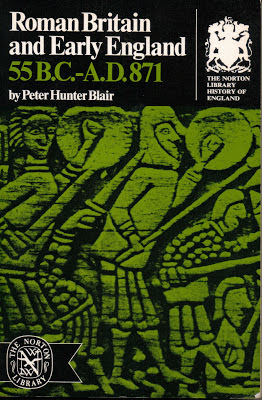Few writers left their marks during the period following the fall of the Roman Empire. Written records during this time are few [55 BC - 871 AD], and the events of the day are not well understood. Peter Hunter Blair provides a brief and very readable account of this early period in the history of the people that occupied the Island after Rome pulled out.
In my growing up days, it was generally known as "The Dark Ages". It took me some time to realize that the same sun shown brightly on these folks that gave the light to my own Kentucky home. [You know, the sun shines bright...on my "old Kentucky Home".] Anyway, the book was published in 1966 by the Norton Library, and its major view is to present the rise of Anglo-Saxon England. Of course those of us with Welsh, Irish, and Scottish lineage will have to dig a little deeper. [There is a good discussion of Offa's Dyke at Llanfair, Shropshire staring p. 229]
Knowledge and understanding of this period in the family tree is one foundation to our JONES surname. This book provides an avenue to the window of time for the time traveler.
From The Jones Genealogist...genealogy for generations.
Monday, May 27, 2013
Thursday, May 16, 2013
The Church and The State
Immense social, political, economic and religious changes had been occurring during the last two centuries of the Roman world. The Emperor Constantine [ 324 AD onward ] saw to it that the Christian religion was legal in the empire, and began a series of changes that were to place the "State" and the "Church" together in a cauldron that would forever change the western world as we have come to know it.
An intimate friend of Constantine was a Greek Bishop named Eusebius. (263 AD - 339 AD) He wrote a history of the Christian Church, leaving a personal account of this period in time.
His work, translated by G.A. Williamson, and published 1965, by Dorset Press, is a very readable version. It provides the reader a clear insight into the mind of Eusebius who has been called the "Christian Herodotus".
For those who need an understanding of the religious beliefs that were to bring the name of "JOHN" into common usage among the people of the world, this would be it. It was the name "JOHN" that was to become the surname "JONES". It is a source of fascinating information for the genealogist and time traveler.
An intimate friend of Constantine was a Greek Bishop named Eusebius. (263 AD - 339 AD) He wrote a history of the Christian Church, leaving a personal account of this period in time.
His work, translated by G.A. Williamson, and published 1965, by Dorset Press, is a very readable version. It provides the reader a clear insight into the mind of Eusebius who has been called the "Christian Herodotus".
For those who need an understanding of the religious beliefs that were to bring the name of "JOHN" into common usage among the people of the world, this would be it. It was the name "JOHN" that was to become the surname "JONES". It is a source of fascinating information for the genealogist and time traveler.
Sunday, May 5, 2013
Later Roman Britain
As the foundations of the Roman world began to unravel, the geographic locations farthest from the center at Rome, began their own attempts at survival. Being at "the end of the world", this Celtic island had its own way of trying to deal with the events of the day.
A small book entitled "Later Roman Britain" by Stephen Johnson", presents a clear account of this period in what was to become the very difficult times following the withdrawal of Roman rule.
For me, the most important aspect was the fact that the "Anglo-Saxon world" had made itself known to this "British Roman world" much before the "Celtic world" would tell their stories. Saxon raiding parties had caused a series of defensive forts to be built along the eastern coastline. This interaction had produced a long history of contact between these folks long before old Vortigern was accused of letting these folks get their foot in the door.
Lots of maps and lots of pictures make this read a neat book to gaze upon. First published 1982 by Paladin, Grafton Books , it has been reprinted in 1986. Later Roman Britain, a bridge to the past.
A small book entitled "Later Roman Britain" by Stephen Johnson", presents a clear account of this period in what was to become the very difficult times following the withdrawal of Roman rule.
For me, the most important aspect was the fact that the "Anglo-Saxon world" had made itself known to this "British Roman world" much before the "Celtic world" would tell their stories. Saxon raiding parties had caused a series of defensive forts to be built along the eastern coastline. This interaction had produced a long history of contact between these folks long before old Vortigern was accused of letting these folks get their foot in the door.
Lots of maps and lots of pictures make this read a neat book to gaze upon. First published 1982 by Paladin, Grafton Books , it has been reprinted in 1986. Later Roman Britain, a bridge to the past.
Subscribe to:
Posts (Atom)


